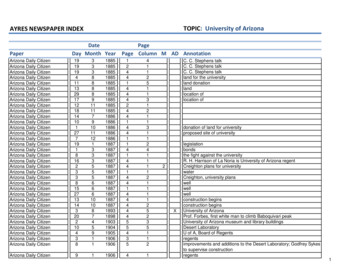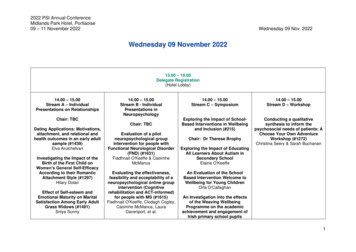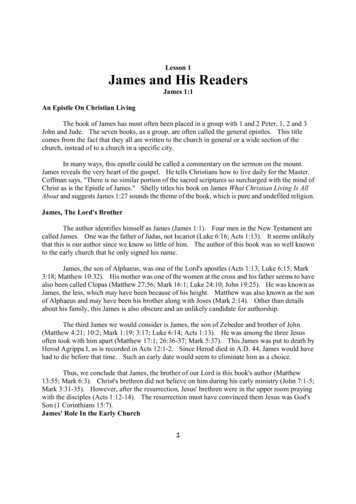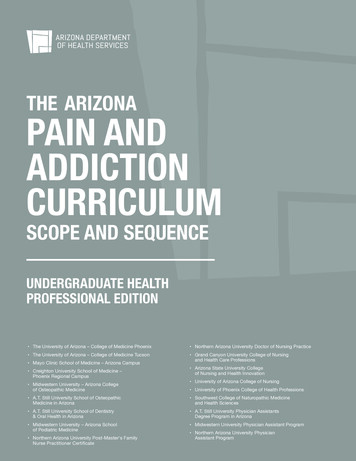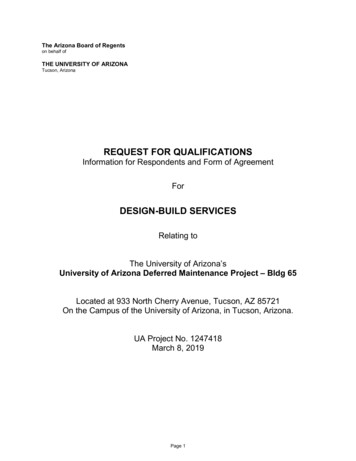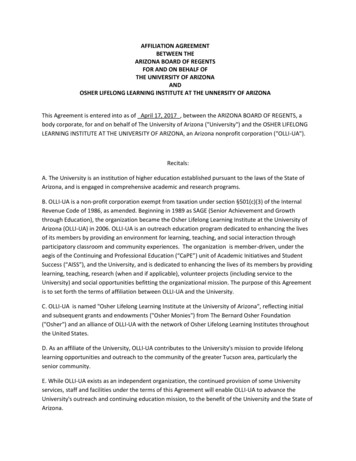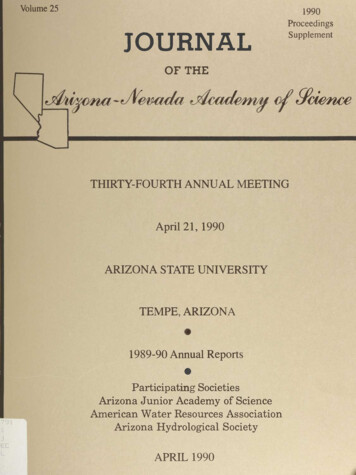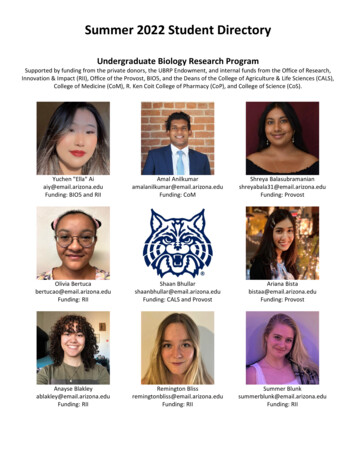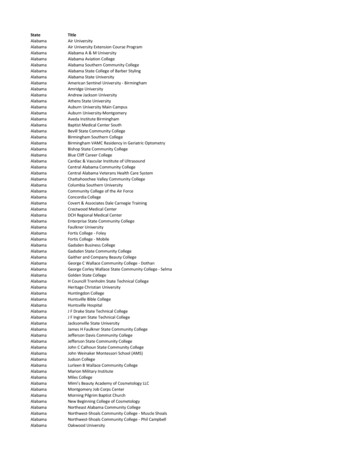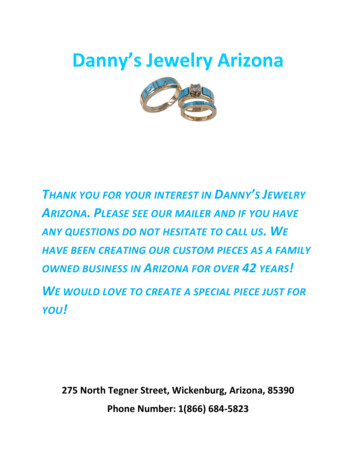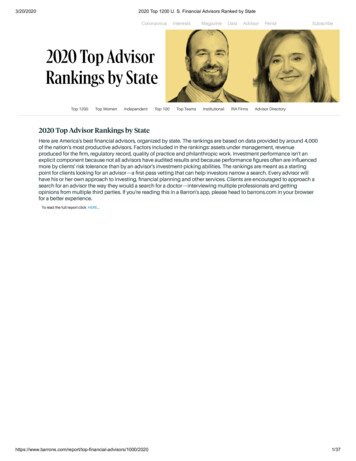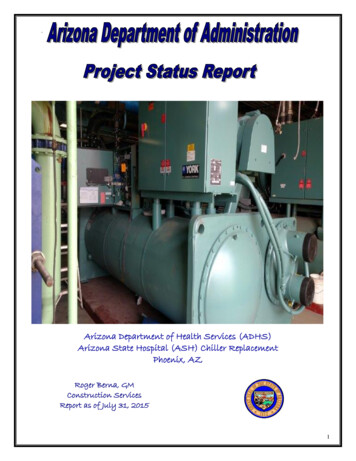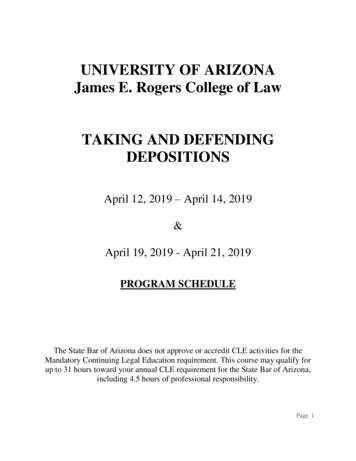
Transcription
UNIVERSITY OF ARIZONAJames E. Rogers College of LawTAKING AND DEFENDINGDEPOSITIONSApril 12, 2019 – April 14, 2019&April 19, 2019 - April 21, 2019PROGRAM SCHEDULEThe State Bar of Arizona does not approve or accredit CLE activities for theMandatory Continuing Legal Education requirement. This course may qualify forup to 31 hours toward your annual CLE requirement for the State Bar of Arizona,including 4.5 hours of professional responsibility.Page 1
OVERVIEW1In this class you will learn how to:1.2.3.4.5.6.7.Effectively prepare your witnesses for their depositions;Defend the deposition;Deal with obstreperous counsel;Get the answers within time constraints;Optimize information from expert witnesses;Test theories; andClose off avenues of escape.For the law students, this class will be graded pass/fail.I.METHOD OF INSTRUCTIONThe method of instruction for this Deposition Program will follow the basiclearning/teaching model developed by the National Institute for Trial Advocacy(NITA). The emphasis will be on "learning by doing" in a simulated depositionsetting with constructive faculty critique. In addition, the program will contain somelectures and demonstrations concerning deposition skills and the issues ofProfessional Responsibility and Professionalism attendant to the taking anddefending of depositions.For the purposes of this program, you will be designated as either an "A" or "B".The "A's" will represent I.M. Tokkin and "B's" will represent Luz Correa and FastTrax, Inc. The assignments for taking or defending the depositions in the case ofI.M. Tokkin v. Luz Correa and Fast Trax, Inc. will be made according to the "A"/"B"designation.Before the program begins, it is absolutely essential that the participants becomethoroughly familiar with the I.M. Tokkin v. Luz Correa and Fast Trax, Inc. materials.That case file will be posted on D2L for the law students and distributed to theattorneys taking the program by email. All of the problems for the program arebased on these materials. Preparation in advance of the program is necessarybecause preparation time during the program is limited.1Information contained in this course syllabus may be subject to change at thediscretion of the instructor with proper notice to students.Page 2
II.MATERIALSS.S. Scholl, Developing Deposition Skills, I.M. Tokkin v. Luz Correa and Fast Trax,Inc., case file. Participants will receive either the Materials for the Plaintiff’s LawFirm or the Materials for the Defendants’ Law Firm. Faculty members will receivethe Materials for the Faculty. Witnesses will receive Witness Only materials.Plaintiffs and Defendants will each receive the Complaint; Answer; Plaintiff’sResponses to Discovery; Defendants’ Responses to Discovery; and, their respectiveexpert witness’ information. Plaintiff’s discovery responses include a copy of theaccident report; photographs and damages evidence. The expert witness materialsprovided are not part of the discovery responses and your opposing counsel have notseen your expert’s information or supporting documentation. Also, each side hasinformation labeled as “Work Product” and that information is not available to theother side in advance of the depositions.III.PROGRAM SCHEDULE OF TOPICS AND ASSIGNMENTSFriday, April 12, 201911:30 – 1:00Faculty Training (See Room Assignment Schedule)12:00 – 1:00Program Registration of Enrolled Attorneys (Lunch on yourown before arrival)1:00 – 2:30Introduction to the Program/Demonstration on Beginningthe Deposition(See Room Assignment Schedule)2:30 – 2:40 BreakWorkshops #1 and #2Beginning the DepositionWorkshops #1 and #2 introduce participants to (1) starting the deposition (2)dealing with preliminary matters and (3) questioning regarding the witness’relevant background though the use of (a) organizational techniques, (b) the“getting the list first” technique, an (c ) the funnel technique. In gatheringPage 3
information, examiners should attempt to practice the “open phase” of thedeposition before going on to the “clarification phase”. Get the info . . . you cansculpt the raw clay later.In addition to obtaining commitments and relevant information, the inquiry of awitness regarding preliminary matters has another, equally important purpose. Thebeginning of the deposition should be used to put the witness at ease and set afriendly tone so that the witness is encouraged to be expansive in the answering ofquestions.2:40 – 3:40Workshop #1 – Introduction to Deposition Skills Deposition of I.M. Tokkin(Meet in Break-up Groups - See Room Assignment Schedule)B’s, on behalf of Luz Correa and Fast Trax, Inc., take thedeposition of I.M. Tokkin from the moment you are ready tostart the deposition through your coverage of:(1)Preliminary matters concerning stipulations andcommitments by the witness; and(2)Tokkin’s personal, education or business/employmentbackground.A’s on behalf of Tokkin, defend your client’s interests duringthe deposition.3:40 – 3:50Break3:50 – 4:50Workshop # 2 Introduction to Deposition Skills –Deposition of Luz Correa(Meet in Break-up Groups - See Room Assignment Schedule)A’s, on behalf of Tokkin, take the deposition of Luz Correafrom the moment you are ready to start the deposition throughyour coverage of:(1)Preliminary matters concerning stipulations andcommitments by the witness; andPage 4
(2)Correa’s personal, educational or business/employmentbackground.B’s, on behalf of the Luz Correa and Fast Trax, Inc., defendyour clients’ interests during the deposition.4:50 – 6:00Discovery Planning Session & Planning for the Deposition(Participants should read Effective Depo, Chapters 4-5)All A’s and all B’s meet separately – See Room AssignmentScheduleSaturday, April 13, 20198:30 – 9:00Faculty Meeting9:00 – 10:00Lecture/Demonstration:Defending the DepositionWorkshops #3 and #4Information Gathering Using The Funnel TechniqueToday’s workshops concentrate on information gathering skills with an emphasison (1) developing and executing the Funnel Technique in order to obtain completeinformation; (2) the use of simple language; (3) taking care to create a clear recordof the deposition; (4) listening carefully to answers; (5) making and dealing withobjections; and (6) using exhibits during the deposition. The Funnel Techniqueensures a comprehensive exploration of a witness’s knowledge of a particularsubject matter by beginning each topic with broad, open-ended questions andprogressively narrowing the focus of the questions until at the end of the “funnel”they are very specific and leading in form. In Workshops #3 and #4, participantsshould try to have the witness identify all general information relevant to a topicbefore attempting to elicit details. This is “getting the list first” technique.*For the purpose of these workshops, deposing attorneys in each groupshould attempt to divide the topics of deposition inquiry. This division is designedto allow participants to fully prepare for a portion of the workshop. Yourpreparation should anticipate the use of relevant exhibits. Overlap among the listedinquiry is permissible.Page 5
10:00 – 11:00Workshop #3 – Information Gathering Using the “FunnelTechnique” – Deposition of I.M. Tokkin(Meet in Break-up Groups – See Room Assignment Schedule)B’s on behalf of Defendant, continue the deposition of Tokkinconcerning one of the following topics:(1)(2)(3)(4)(5)(6)Tokkin’s version of the facts of the crash;Tokkin’s realization he/she was injured;Tokkin’s experience with the law;Tokkin’s activities the day of, but before the crash;Property damage issues and Personal injury damages;Any topic not fully covered in the morning session.A’s on behalf of Defendants, defend your clients interests duringTokkin’s deposition.11:00 – 11:15Break11:15 – 12:15Workshop #4 – Information Gathering Using the “FunnelTechnique” – Deposition of Luz Correa(Meet in Break-up Groups – See Room Assignment Schedule)A’s on behalf of Tokkin, continue the deposition of Luz Correaconcerning one of the following topics 1:(1)(2)(3)(4)Fast Trax’s business and Correa’s job duties;Correa’s activities the morning before the crash;Correa’s observations of Tokkin after the crash;Correa’s reporting of the crash to Fast Trax.B’s on behalf of Defendant, defend your client’s interests.12:15 – 1:15LunchPage 6
Workshops #5 and #6Working Down the Funnel1:15– 1:55Usecontinueof Documents& FoundationsIn Workshops#5Lecture/Demonstration:and #6, participants willto practicethe Funnelin the DepositionTechnique. After participantsidentify a general topic, they should “move downthe funnel” in order to elicit all relevant details about that topic. Participates should*Fortothepracticepurpose ofworkshops,attorneys“closingin each groupattemptthethesetechniquesof tto divideAlso,the topicsof ng.in Workshops#5 and#6, theThisfacultymay isassumethe toroleofparticipantsto fully obstreperousprepare for a portionof theworkshop.Yourinstructionpreparationofshouldan inappropriatelydefendingcounselto providehowanticipatethelawyersuse of relevantexhibits.Overlapamong the listed topics of inquiry isto deal withwho behavein sucha manner.permissible.2:00 – 3:00Workshop #5 – Information Gathering: “Working Down theFunnel” – Deposition of I.M. Tokkin(Meet in Break-up Groups – See Room Assignments Schedule)B’s, on behalf of Defendant, continue the deposition of Tokkinconcerning one of the following topics using exhibits where youcan:(1)(2)(3)(4)(5)Issues raised by the police report;Tokkin’s physical injuries;Tokkin’s property damage claim;Tokkin’s lost income claim; orTokkin’s medical treatments.A’s, on behalf of Tokkin, defend you client’s interests during thedeposition.3:00 – 3:15Break3:15 – 4:15Workshop #6 – Information Gathering: “Working Down theFunnel” – Deposition of Luz Correa(Meet in Break-up Groups – See Room Assignments Schedule)A’s, on behalf of Tokkin, continue the deposition of Correaconcerning one of the following topics using exhibits where youcan:(1)Correa’s version of what happened with the crash;Page 7
(2)(3)(5)(6)(7)Luz Correa and Fast Trax, Inc.’s communications aboutthe crash;Issues raised by the police report;Correa’s driving history;Fast Trax corporate personality; or,Any topic not fully covered during the morning session.B’s, on behalf of Defendant, defend your client’s interests duringthe deposition.4:20 – 5:45Lecture/Demonstration: Ethics and Professionalism inWitness PreparationSunday, April 14, 20198:00 – 8:30Faculty Meeting8:30 – 9:10Theory Testing: Using Leading Questions and“Questments” to Harvest Admission and Test Theories9:15 – 9:45Brainstorming Session: The Witness as Punctuation Mark(All “A’s” and “B’s” meet together as directed in smallergroups)9:45 – 10:00BreakWorkshop #7Ethical Witness PreparationFor the purposes of Workshops #7, assume that Tokkin and Correa are meetingwith their counsel the day before their respective depositions. In this Workshop,participants will attempt the tactically and ethically complex task of preparingTokkin and Correa for their deposition, and in particular, for opposing counsel’sattempts to test theories of his or her case to obtain critical admissions. Participantsmust prepare their client to testify in a poised and persuasive matter with all thefacts in mind. One participant can do the “ecology check”, another participant canexplain the rules of the road, a third participant can act as the opposing counsel insubjecting the witness to the toughest questions, and the fourth participant will actas the facilitator.Page 8
10:00 – 12:00Workshop #7 – Preparation of Tokkin and Correa for theirDeposition(All Participants Meet Their Client in Witness PreparationGroups – See Room Assignment Schedule)A’s, on behalf of Plaintiff, prepare Tokkin for deposition.B’s, on behalf of Defendants, prepare Correa for deposition.Defense counsel have been hired by Fast Trax’s insurer which isdefending the case on a General Liability Commercial Policywhich provides coverage for the company and its employees whoare acting within the course and scope of their employment.This workshop will stimulate certain initial housekeeping tasks,such as representation issues, new client information for counsel,client concerns about the upcoming deposition, witnessfamiliarization with the format of a deposition and the “rules” oftestifying, an explanation of the theory of the case and key issues.Counsel may apportion each job, but there should be one leadlawyer who explains all this to the client, who may be somewhatfragile and suspicious. Meet the client at the door and escort in.Second, participants will conduct a mock examination of theclient rehearsing and “shaping” the client’s answers to the“hardest questions” the witness could be asked. It is suggestedthat each participant recruit another member of their group tocross-examine the client. This relieves counsel of having to beboth the “bad guy” and the “good guy” at the same time12:00 – 1:00LunchPage 9
Workshops #8 and #9Fact Gathering Using the Funnel TechniqueWorkshops #8 and #9 provide a further opportunity for participants to work on theskills of gathering information using the “Get the List” and Funnel Techniques.After choosing a topic, (1) Headline &/or ask a directive question; (2) Ask wideopen questions to get the witness talking; (3) Ask open-ended questions to getinformation; (4) Exhaust each point with “what else?” (5) Mini-recap with“anything else?” (6) Probe and test with leading questions; and (7) Askrecapitulating/summary questions to lock-in the answer for the record.1:00 – 2:15Workshop #8 – Gathering Information Using the FunnelTechnique – Deposition of Luz Correa(Meet in Break-up Groups – See Room Assignment Schedule)A’s, on behalf of Plaintiff, pick up the deposition of Correa onsome salacious topics you are interested in and which advanceyour case theory.B’s, on behalf of Defendants, defend your client’s interestsduring Correa’s deposition2:15 – 3:30Workshop #9 – Gathering Information Using the FunnelTechnique – Deposition of I.M. Tokkin(Meet in Break-up Groups – See Room Assignment Schedule)B’s, on behalf of Defendant, pick up the deposition of Tokkinand get the good stuffA’s, on behalf of Plaintiff, defend your client’s interests duringTokkin’s depositionPage 10
Week TwoFriday, April 19, 201911:30 – 11:55Faculty Meeting (See Room Assignment Schedule -- Lunchprovided)*Lunch on your own for participants before session begins.12:00 – 1:30Lecture/Demonstration: Dealing with the ObstreperousLawyer/Objections and the Ethical and ProfessionalismIssues Involved (30 minutes devoted toethics/professionalism by examining rules and standards ofconduct between lawyers in the adversarial circumstancesof deposition)Workshops #10 and #11Obtaining Admission sand Theory TestingWorkshops #10 and #11 provide an opportunity for participants to work on theskills of testing potential legal, factual, or persuasive theories of the case they haveformulated, as well as work on obtaining admission that inform those theories andcontribute to winning or defeating Summary Judgment on a particular issue. Wedefine legal theory as describing why the law will support a finding for your client,factual theory as an explanation of what actually happened in the case, andpersuasive theory as describing a way of presenting the case that will make thefact finder want to find in favor of your client. Theory testing a deposition usescross-examination style questioning techniques. Leading questions, witnesscontrol, securing clear admissions and denials are used to test what legal andfactual theories will work at trial and what will not.1:30 – 1:45Break1:45 – 2:45Workshop #10 – Theory Testing and Obtaining Admission– Deposition of Correa(Meet in Break-up Groups – See Room Assignment Schedule)A’s, on behalf of Plaintiff, continue the deposition of Correa byeliciting admissions that support or test one of your factual orPage 11
legal theories using cross-examination techniques. Write 1-3sentence statement of the theory you want to test and give it tothe instructor before you begin to perform. This will assist youin planning the theory testing and aid the instructor in evaluatingyour performance. Use theories developed during your brainstorming session or as you have heard the evidence unfold.B’s, on behalf of Defendants, defend your client’s interestsduring Luz Correa’s deposition.2:45 – 3:45Workshop #11 – Theory Testing and Obtaining Admission –Deposition of Tokkin(Meet in Break-up Groups – See Room Assignment Schedule)B’s, on behalf of Defendants, continue the deposition of Tokkinby eliciting admissions that support or test one of your factual orlegal theories using cross-examination techniques. Write a 1-3sentence statement of the theory you want to test and give it tothe instructor before you begin to perform. This will assist youin planning the theory testing and aid the instructor in evaluatingyour performance. Use theories developed during your brainstorming session or as you have heard the evidence unfold.A’s, on behalf of Plaintiff, defend your client’s interests duringthe deposition.3:45 – 4:00Break4:00 – 5:00Lecture/Demonstration: Deposing the ExpertPage 12
Saturday, April 20, 20198:15 – 8:45Faculty Meeting8:45 – 10:00Lecture/Demonstration: Expert Witness Preparation10:00 – 10:15Break10:15 – 12:15Meet With Your Expert12:15 – 1:15LunchWorkshops #12 and #13Getting Qualifications and the Opinion1:20 – 2:50Workshop #12 -- Getting Qualifications and the OpinionDeposition of the Plaintiff’s ExpertB’s conduct a deposition of the Plaintiff’s expert witness on thefollowing topics1)2)3)The expert’s assignmentThe expert’s qualifications; andThe expert’s opinionsA’s defend the deposition of the Plaintiff’s expert witness.2:50 – 3:05Break3:05 – 4:35Workshop #13 -- Getting Qualifications and the OpinionDeposition of Defendants’ ExpertA’s conduct a deposition of the Defendants’ expert witness onthe following topics:1)2)3)The expert’s assignment;The expert’s qualifications; andThe expert’s opinionsPage 13
B’s defend the deposition of the Defendants’ expert witness.Sunday, April 15, 20188:30 – 9:00Faculty Meeting9:00 – 10:15Lecture/Demonstration: Ethics and Professionalism whenDealing with Experts10:15 – 10:30BreakWorkshops #14 and #15Exhausting and Theory Testing10:30 – 12:15Workshop #14 -- Exhausting & Theory TestingDeposition of Plaintiff’s ExpertB’s conduct a deposition of the Plaintiff’s expert witness on thefollowing topics:1)2)The basis for the expert’s opinionsHow the expert arrived at the opinions being offeredA’s defend the deposition of the Plaintiff’s expert witness.12:15 – 1:15Lunch1:15 – 2:45Workshop #15 – Exhausting & Theory TestingDeposition of Defendants’ ExpertA’s conduct a deposition of the Defendants’ expert on thefollowing topics:1)2)The basis for the expert’s opinion;How the expert arrived at the opinions being offered.Page 14
B’s defend the deposition of the Defendants’ economic expertwitness.2:45 – 3:00BreakWorkshops #16 and #17More Exhausting & Theory Testing3:00 – 4:00Workshop # 16 -- More Exhausting & Theory TestingPlaintiff’s ExpertChallenge the expert’s opinions and bases.4:00 – 5:00Workshop # 17 -- More Exhausting & Theory TestingDefendants’ ExpertChallenge the expert’s opinions and bases.5:00Conclusion and EvaluationPage 15
UNIVERSITY OF ARIZONA James E. Rogers College of Law TAKING AND DEFENDING DEPOSITIONS April 12, 2019 - April 14, 2019 & April 19, 2019 - April 21, 2019 PROGRAM SCHEDULE The State Bar of Arizona does not approve or accredit CLE activities for the Mandatory Continuing Legal Education requirement. This course may qualify for
